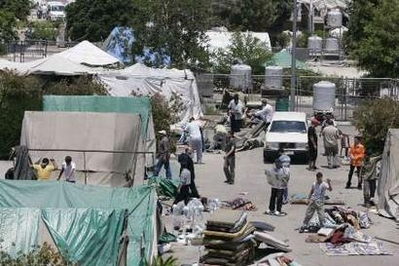 DOHA – Rival Lebanese leaders signed a deal on Wednesday to end 18 months of political conflict that had pushed their country to the brink of a new civil war. The deal, concluded after six days of Arab-mediated talks in Qatar, paved the way for parliament to elect army chief General Michel Suleiman as president, filling a post vacant since November because of the political deadlock. Lebanese Parliament speaker Nabih Berri said Suleiman would be elected president this week most likely on Sunday May 25th. The deal between the ruling coalition and the opposition resolved a dispute over a parliamentary election law and met the opposition’s long-standing demand to obtain 11 Cabinet seats under the deal. In fact lin a ate night meeting on Tuesday of a six-member committee to discuss the electoral law finally achieved a breakthrough. Following a short session, opposition MP Ali Hassan Khalil told NBN television that a settlement was in the offing. The feuding parties have finally managed to agree on dividing Beirut into three balanced constituencies. The first constituency is a Christian one with five seats, the second is a mixed one with four seats, and the third is a Sunni-dominated one with 10 seats. On the other hand, Reform and Change bloc leader Michel Aoun will have to fight to win the five seats in the Christian district as the Armenian vote will be a deciding factor in the mixed constituency. Up until the last minute, Aoun was reportedly fighting to put six seats in the Christian district, but ended up accepting the 10-5-4 formula. The current ruling coalition will get 16 seats. The remaining seats will be distributed by the incoming president, in the 30-member cabinet. Under the deal, the two sides also agreed on an electoral law, which divides the Mediterranean Sea country into smaller-sized political districts. Parliament Speaker Nabih Berri also will call parliament to session to elect army chief, Gen. Michel Suleiman, as the country new president in the next 24 hours, the Qatari prime minister said.
DOHA – Rival Lebanese leaders signed a deal on Wednesday to end 18 months of political conflict that had pushed their country to the brink of a new civil war. The deal, concluded after six days of Arab-mediated talks in Qatar, paved the way for parliament to elect army chief General Michel Suleiman as president, filling a post vacant since November because of the political deadlock. Lebanese Parliament speaker Nabih Berri said Suleiman would be elected president this week most likely on Sunday May 25th. The deal between the ruling coalition and the opposition resolved a dispute over a parliamentary election law and met the opposition’s long-standing demand to obtain 11 Cabinet seats under the deal. In fact lin a ate night meeting on Tuesday of a six-member committee to discuss the electoral law finally achieved a breakthrough. Following a short session, opposition MP Ali Hassan Khalil told NBN television that a settlement was in the offing. The feuding parties have finally managed to agree on dividing Beirut into three balanced constituencies. The first constituency is a Christian one with five seats, the second is a mixed one with four seats, and the third is a Sunni-dominated one with 10 seats. On the other hand, Reform and Change bloc leader Michel Aoun will have to fight to win the five seats in the Christian district as the Armenian vote will be a deciding factor in the mixed constituency. Up until the last minute, Aoun was reportedly fighting to put six seats in the Christian district, but ended up accepting the 10-5-4 formula. The current ruling coalition will get 16 seats. The remaining seats will be distributed by the incoming president, in the 30-member cabinet. Under the deal, the two sides also agreed on an electoral law, which divides the Mediterranean Sea country into smaller-sized political districts. Parliament Speaker Nabih Berri also will call parliament to session to elect army chief, Gen. Michel Suleiman, as the country new president in the next 24 hours, the Qatari prime minister said.
"The parties agreed that the speaker of parliament will call within 24 hours for the election of General Michel Suleiman as president of the republic," Qatari Prime Minister Sheikh Hamad bin Jassim bin Jabr al-Thani said, reading from the agreement at the signing ceremony in Doha. A few bursts of celebratory gunfire broke out in Beirut’s after the announcement. Lebanese television stations showed Lebanese politicians and their Arab hosts congratulating and hugging one another.
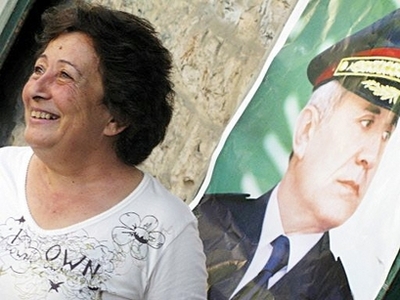 Speaking in Doha at the ceremony, Berri said opposition supporters would also dismantle their "tent city" protest camp.which the opposition has started immediately. The opposition has been camped out for more than a year in downtown Beirut across from the prime minister’s office. Berri said this would be a "gift" from the opposition, hailing the Doha agreement. Saniora, also addressing the ceremony, called on the Lebanese to reject violence and asked Arab states to help support Lebanon’s army, which kept a neutral role during the latest clashes. "We must … pledge never to resort to arms to resolve our political differences," Saniora said. "We should accept each other and hold dialogue to solve the problems. We want to live together and we will continue that. We have no other choice." The Doha-based negotiations came after the Arab League mediated a deal to end the week of deadly violence that paralyzed parts of the country. The Qatar negotiations hit snags from the very start, with neither side willing to give concessions. The agreement was reached after host Qatar stepped up the pressure Tuesday with Qatari Emir Sheik Hamad Bin Khalifa Al-Thani personally intervening. "There are no losers," said Lebanese Telecommunications Minister Marwan Hamadeh, "Lebanon is the winner."
Speaking in Doha at the ceremony, Berri said opposition supporters would also dismantle their "tent city" protest camp.which the opposition has started immediately. The opposition has been camped out for more than a year in downtown Beirut across from the prime minister’s office. Berri said this would be a "gift" from the opposition, hailing the Doha agreement. Saniora, also addressing the ceremony, called on the Lebanese to reject violence and asked Arab states to help support Lebanon’s army, which kept a neutral role during the latest clashes. "We must … pledge never to resort to arms to resolve our political differences," Saniora said. "We should accept each other and hold dialogue to solve the problems. We want to live together and we will continue that. We have no other choice." The Doha-based negotiations came after the Arab League mediated a deal to end the week of deadly violence that paralyzed parts of the country. The Qatar negotiations hit snags from the very start, with neither side willing to give concessions. The agreement was reached after host Qatar stepped up the pressure Tuesday with Qatari Emir Sheik Hamad Bin Khalifa Al-Thani personally intervening. "There are no losers," said Lebanese Telecommunications Minister Marwan Hamadeh, "Lebanon is the winner."
Daily star: Lebanese lawmakers are set to elect the commander of the Lebanese Armed Forces, General Michel Suleiman, as president on Sunday after rival political leaders clinched a deal in Doha on Wednesday to end an 18-month feud that exploded into deadly sectarian fighting and threatened to plunge the nation into all-out civil war. The deal that was reached at Doha after four days of intensive talks will lead to electing Suleiman, forming a national unity cabinet, and drafting a new electoral law for the 2009 parliamentary elections. The agreement was announced by Qatari Emir Sheikh Hamad bin Khalifa al-Thani at noon Wednesday as the rival leaders gathered at a roundtable. "Some of you took to the streets asking your leaders not to return to Lebanon without reaching an agreement … I would like to tell you that your leaders have finally agreed and they will shortly be on their way back," Sheikh Hamad said, addressing the Lebanese people. The rival leaders officially signed the agreement shortly after it was announced. They arrived in Beirut later in the day. As the good news reached Beirut, people in the capital and in different areas of the country could not help but show their content and relief. The feeling of relief was followed by instant action as opposition supporters began to remove tents at the site of their 18-month sit-in in Downtown Beirut after Speaker Nabih Berri declared an end to the protest. Berri said that ending the sit-in was a gift from the opposition to the Doha agreement. The speaker also thanked Qatari and Arab mediators for their role in helping Lebanese parties reach an agreement. The long-awaited deal addressed two key issues of contention between the opposition and ruling majority. As far as forming a national unity government is concerned, the opposition has managed to get its long-demanded veto power. The new cabinet will be made up of 16 ministers for the parliamentary majority, 11 for the opposition, and three for the elected president. The 11 ministers (one third plus one of the 30-member cabinet) are all that it takes for the opposition to block any government decision to which its is opposed. However, the next cabinet is not due to last long as it will resign by default when the parliamentary elections are due next spring. Meanwhile, the most important deal of all was the agreement reached on drafting a new electoral law for the 2009 parliamentary elections. The issue of the electoral law was the major hurdle to the success of the Doha talks after the rival sides, which approved adopting the qada (smaller district) as an electoral constituency, appeared at odds over how to divide seats in Beirut. As the Doha talks were moving close to failure, a late night meeting on Tuesday of a six-member committee to discuss the electoral law finally achieved a breakthrough. Following a short session, opposition MP Ali Hassan Khalil told NBN television that a settlement was in the offing. The feuding parties have finally managed to agree on dividing Beirut into three balanced constituencies. The first constituency is a Christian one with five seats, the second is a mixed one with four seats, and the third is a Sunni-dominated one with 10 seats. The formula is likely to secure for parliamentary majority leader Saad Hariri at least 10 out of Beirut’s 19 seats. On the other hand, Reform and Change bloc leader Michel Aoun will have to fight to win the five seats in the Christian district as the Armenian vote will be a deciding factor in the mixed constituency. Up until the last minute, Aoun was reportedly fighting to put six seats in the Christian district, but ended up accepting the 10-5-4 formula. As for other parts of the country, the two sides agreed on adopting the divisions of the 1960 electoral law. Prime Minister Fouad Siniora described the agreement as a "great achievement in … the history of Lebanon." Speaking shortly after the Qatari emir announced the agreement, Siniora called on all Lebanese parties to condemn violence and pledge not to use arms to settle political disputes. The Doha agreement has committed all parties not to use violence and stated that security was the exclusive responsibility of the Lebanese state. Under the agreement, a dialogue is set to begin in Beirut to address the issue of the state’s relations with political groups in the country. Such dialogue is to be held under the auspices of the new president. The issue of Hizbullah’s possession of arms was not discussed at the Doha talks or mentioned in the agreement as the Arab committee decided to make do with banning the use of violence, a clear reference to the recent clashes in Lebanon between opposition and pro-government militants. The clashes left up to 65 dead and 250 wounded. Hariri also praised the deal. "Today, we are opening a new page in Lebanon’s history," he said
For more details please click read more

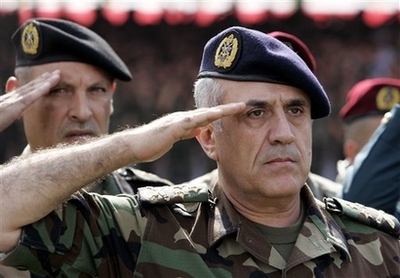 Beirut – Lebanon’s army commander Michel Suleiman will be Lebanon’s ‘unity president’ after rival Lebanese political factions agreed, after talks in Qatar, to end their differences in a deal to resolve the 18-month crisis that has kept the country without a president since November.
Beirut – Lebanon’s army commander Michel Suleiman will be Lebanon’s ‘unity president’ after rival Lebanese political factions agreed, after talks in Qatar, to end their differences in a deal to resolve the 18-month crisis that has kept the country without a president since November.  DOHA – Rival Lebanese leaders signed a deal on Wednesday to end 18 months of political conflict that had pushed their country to the brink of a new civil war. The deal, concluded after six days of Arab-mediated talks in
DOHA – Rival Lebanese leaders signed a deal on Wednesday to end 18 months of political conflict that had pushed their country to the brink of a new civil war. The deal, concluded after six days of Arab-mediated talks in  Speaking in Doha at the ceremony, Berri said opposition supporters would also dismantle their "tent city" protest camp.which the opposition has started immediately. The opposition has been camped out for more than a year in
Speaking in Doha at the ceremony, Berri said opposition supporters would also dismantle their "tent city" protest camp.which the opposition has started immediately. The opposition has been camped out for more than a year in 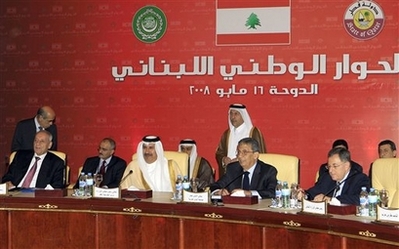 Rival Lebanese leaders made progress on issues at the heart of their political crisis on Sunday but Qatari-mediated talks face major hurdles to a deal to pull Lebanon back from a civil war. Qatari Prime Minister Sheikh Hamad bin Jassim bin Jabr al-Thani met with members of th epro-government and opposition end a crisis that has paralyzed the government and left Lebanon with no president. But delegates said Sheikh Hamad had yet to win final approval on one of the prickliest issues on the agenda — the shape of a new government — after making several proposals including one to split seats three ways equally among rivals. A six-member committee created on Saturday to lay the framework for a new election law has made progress and was now working out the details of how to divide
Rival Lebanese leaders made progress on issues at the heart of their political crisis on Sunday but Qatari-mediated talks face major hurdles to a deal to pull Lebanon back from a civil war. Qatari Prime Minister Sheikh Hamad bin Jassim bin Jabr al-Thani met with members of th epro-government and opposition end a crisis that has paralyzed the government and left Lebanon with no president. But delegates said Sheikh Hamad had yet to win final approval on one of the prickliest issues on the agenda — the shape of a new government — after making several proposals including one to split seats three ways equally among rivals. A six-member committee created on Saturday to lay the framework for a new election law has made progress and was now working out the details of how to divide 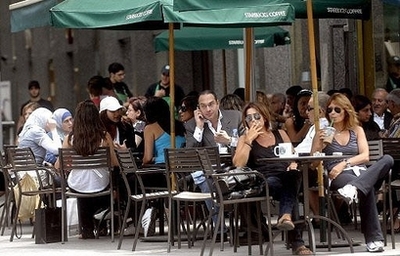 DOHA (Reuters) – Rival Lebanese leaders flew to Qatar on Friday aiming to end a protracted political conflict that has pushed the country to the brink of a new civil war.Qatar’s Emir Sheikh Hamad bin Khalifa al-Thani was due to open the talks in a Doha hotel at 9:00 pm (1800 GMT). "Let us deal with matters calmly at the dialogue table. Each one of us and them must offer concessions to bury strife," Walid Jumblatt said during a tour of Druze villages. We are going to the dialogue with a great political wound," said Jumblatt, who later flew to Doha in a Qatar Airways plane along with both his allies and rivals. Lebanese forces leader Samir Geagea, former president Amin Gemayel and Druze leader Walid Jumblatt of the ruling coalition boarded a Qatari aircraft along with opposition member and parliament speaker Nabih Berri and the Free Patriotic leader Michel Aoun. The leader of the militant Shiite Hezbollah movement Sheikh Hassan Nasrallah did not go to Qatar, apparently for security reasons, but was to be represented by Hezbollah MP Mohammed Raad.
DOHA (Reuters) – Rival Lebanese leaders flew to Qatar on Friday aiming to end a protracted political conflict that has pushed the country to the brink of a new civil war.Qatar’s Emir Sheikh Hamad bin Khalifa al-Thani was due to open the talks in a Doha hotel at 9:00 pm (1800 GMT). "Let us deal with matters calmly at the dialogue table. Each one of us and them must offer concessions to bury strife," Walid Jumblatt said during a tour of Druze villages. We are going to the dialogue with a great political wound," said Jumblatt, who later flew to Doha in a Qatar Airways plane along with both his allies and rivals. Lebanese forces leader Samir Geagea, former president Amin Gemayel and Druze leader Walid Jumblatt of the ruling coalition boarded a Qatari aircraft along with opposition member and parliament speaker Nabih Berri and the Free Patriotic leader Michel Aoun. The leader of the militant Shiite Hezbollah movement Sheikh Hassan Nasrallah did not go to Qatar, apparently for security reasons, but was to be represented by Hezbollah MP Mohammed Raad.


